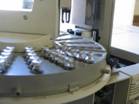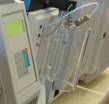|
Quality Environmental Laboratory Services |
|
Castle Analytical Laboratory |

|
Home | About Us | Contact Us | Analytical Services | Related Links | FAQs | Forms |
|
Home |
|
About Us |
|
Contact Us |
|
Analytical Services |
|
Related Links |
|
FAQs |
|
Forms |
|
Castle Analytical Laboratory performs analysis on water, soils, oils, solid wastes and air. In most cases sampling containers can be supplied to the client. Turn around time - Our usual turn around time is five working days, expedited turnarounds are available upon request. General Pricing and Bids - Available upon request, just give us a call (209) 384-2930 Sub-contracting – We have relationships with other labs that have provided us with service through the years to cover a host of other testing. We are also available to other laboratories requiring sub-contracting services. |
|
Analytical Services |
|
Volatile organic compounds (VOCs) are emitted as gases from certain solids or liquids. VOCs include a variety of chemicals, some of which may have short- and long-term adverse health effects. VOCs are emitted by a wide array of products numbering in the thousands. At Castle Analytical the most common VOCs seen include light petroleum contaminates such as benzene and toluene to dry cleaning solvents such as tetrachloroethene (PCE) and trichloroethene (TCE). Castle Analytical is certified to do volatile organic compounds by EPA 8021 and EPA 8260. Castle Analytical performs VOCs analysis of various matrices including water, soil, air, and oil. |
|
For more information about this service: |
|
Volatile Organic Compounds (VOCs) |
|
E-mail: main@castle-lab.com or call 209-384-2930 |

|
© 2012 Castle Analytical Laboratory. Disclaimer: This website is for informational purposes only. It is recommended the information contained is this website be validated for accuracy. |
|
Since Castle Analytical first opened in 1995 our specialty has been analysis of samples for the California UST (Underground Storage Tank) Program. Castle Analytical is certified for the analysis of petroleum contamination in matrices such as water, soil and air. EPA method 8015 is utilized to test for gasoline, diesel, motor oil and other petroleum products such as mineral oil (dielectric fluid) using gas chromatography with Flame Ionization Detection (GC/FID). EPA method 8021 (GC/PID) and 8260 (GC/MS) are used in the analysis of gasoline components such as methyl tert-butyl ether (MTBE), benzene, toluene, ethylbenze and xylenes. Castle Analytical is also certified to do the TRPH (Total Recoverable Petroleum Hydrocarbon) screening method. |
|
For more information about this service: |
|
E-mail: main@castle-lab.com or call 209-384-2930 |
|
Petroleum Hydrocarbons |
|
Polychlorinated biphenyls PCBs are any of the 209 configurations (PCB congener) with 2 to 10 chlorine atoms attached to biphenyl, which is a molecule composed of two benzene rings. The chemical formula for a PCB is C12H10-nCln. The most common Aroclors 1016, 1221, 1232, 1242, 1254 and 1260 are different mixtures of PCB congeners each having a distinctive pattern. The first two digits generally refer to the number of carbon atoms in the phenyl rings, the second two numbers indicate the percentage of chlorine by mass in the mixture. For example, the name Aroclor 1254 means that the mixture contains approximately 54% chlorine by weight.
|
|
For more information about this service: |
|
E-mail: main@castle-lab.com or call 209-384-2930 |
|
Polychlorinated Biphenyls (PCBs) |
|
Castle Analytical Laboratory specializes in the analysis of PCB Aroclors in various matrices including oil, soil, water, wipes, and lead cable paper. Castle Analytical utilizes EPA method 8082 using a capillary column gas chromatography with electron capture detector (GC/ECD). Our PCB chemist has had over 20 years laboratory experience with the majority being PCB analysis. We are available for Emergency PCB analytical services. |


